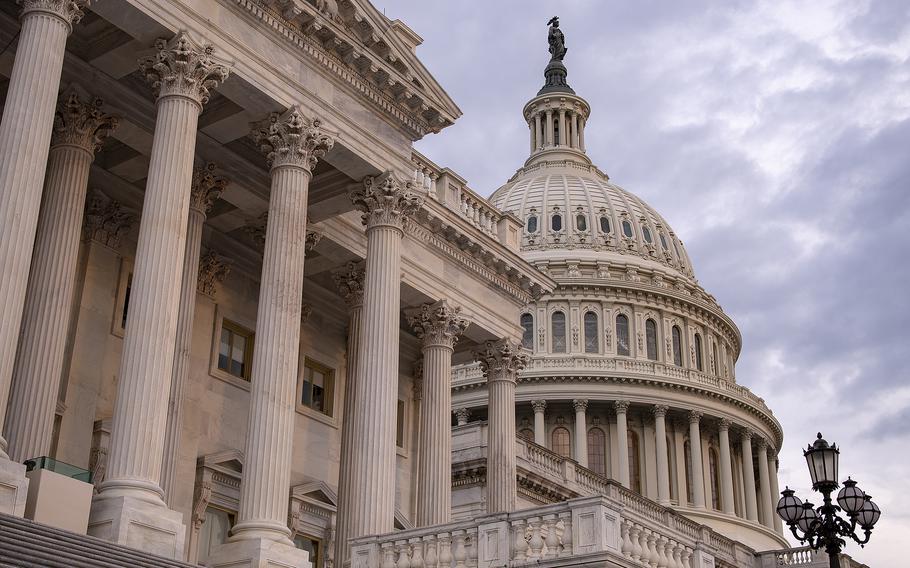
The U.S. Capitol as seen in Washington, D.C., on July 6, 2022. (Carlos Bongioanni/Stars and Stripes)
Stars and Stripes is making stories on the coronavirus pandemic available free of charge. See more stories here. Sign up for our daily coronavirus newsletter here. Please support our journalism with a subscription.
WASHINGTON — House members approved a 2023 defense policy bill Thursday that rolls back a controversial coronavirus vaccine mandate for service members, invests in programs to counter Russia and China and bulks up the defense budget by $45 billion.
Two-thirds of the House, 350-80, voted for the National Defense Authorization Act, an annual must-pass legislation that outlines priorities for the Pentagon and other agencies involved in defense. The bill authorizes $858 billion, including $847 billion for defense programs for the fiscal year that began Oct. 1.
“This is a good bill that advances the national security of the United States,” said Rep. Rob Wittman, R-Va.
Republicans led the effort to rescind the vaccine mandate, but it found support among Democrats as well. Rep. Adam Smith, D-Wash., the chairman of the House Armed Services Committee, said Wednesday that he no longer supported the policy.
“The policy the DOD implemented in August 2021 requiring service members to be vaccinated was absolutely the right policy, it saved lives and it made sure that our force was as ready as it possibly could be in the face of the pandemic,” he said. “Now in December 2022, does that August 2021 policy still make sense? Is it still the right policy? We don’t believe that it is, and I don’t believe that it is.”
Smith noted troops who adhered to the mandate and got a shot last year were now unprotected from the coronavirus. The policy only mandated initial vaccination but not subsequent boosters, he said.
“It’s time to update the policy, and that is what we require in this legislation,” Smith said.
The White House pushed back on the decision Wednesday but did not indicate whether President Joe Biden would veto the bill over the vaccine issue. White House National Security Council spokesman John Kirby told reporters the administration still considered rescinding the mandate “a mistake” and blamed Republicans for fighting “against the health and well-being” of troops.
Rep. Mike Rogers of Alabama, the top Republican on the House Armed Services Committee, said he will try to ascertain who was “adversely affected” by the mandate and “make them whole” when Republicans take control of the House in January and he becomes the committee’s chairman.
The defense bill requires the Pentagon to find out which troops were affected by the mandate and submit a report to Congress.
Thousands of troops were discharged for refusing to take the vaccine, though the vast majority complied with the mandate. Smith on Thursday defended the dismissal policy, calling it a consequence of not following orders.
“Orders are not optional in the United States military,” he said. “We’re not going to undo that.”
Rogers promised to continue work on other quality-of-life issues for troops in the next Congress, including income, health care, child care and housing.
The defense bill approved Wednesday gives service members the largest pay raise in 20 years, hiking up salaries by 4.6%, and increases special pay and bonuses by more than 30%. It also devotes $750 million to ensure commissaries don’t raise prices due to inflation and allows for more generous housing and basic needs allowances.
Competition with China and Russia’s war in Ukraine are driving many of the bill’s investments in weapons and programs. The Pacific Deterrence Initiative will receive $11.5 billion in new investments under the bill to strengthen operations in Indo-Pacific region while Taiwan, the island that China claims as its “sacred” territory, will see increased security cooperation with the United States.
The bill authorizes $800 million for a fund used to purchase weapons for Ukraine as well as $2.7 billion to ramp up production capacity for munitions sent to Ukraine’s forces.
Smith and Rogers pushed back against criticism, mainly from Republicans, that the aid flowing to Ukraine is being misspent. The bill requires the Defense Department to report any gaps in oversight but Rogers said the Pentagon continues to provide satisfactory briefings to lawmakers on the issue.
“There is no evidence that we don’t have confidence that the money we’re giving, the supplies we’re giving are going where they’re supposed to go,” Rogers said.
Other provisions in the authorization legislation build upon military justice reforms enacted last year by removing certain prosecutorial powers from military commanders and giving them to new military prosecution offices. The changes were inspired by the preponderance of sexual harassment and sexual assault allegations in the military.
“We took sexual assault out of the chain of command last year in the NDAA, this year we take sexual harassment out of the chain, and we require trained investigators who will investigate cases outside the brigade,” said Rep. Jackie Speier, D-Calif. “It’s critical for the safety of military personnel because sexual harassment begets sexual assault.”
The bill also includes a required review of suicide rates in the services, broken down by rank and other details. Service members stationed in isolated and cold locations, such as Alaska, will receive special duty pay for the hardship, according to the legislation.
Senators are expected to vote on the bill next week, followed by the signing of the bill by Biden. Congress still needs to pass appropriations legislation that will give the Pentagon and other agencies the authority to spend the money authorized by the defense policy legislation.